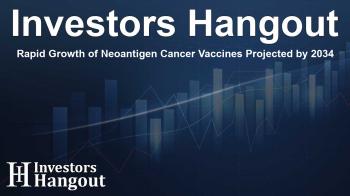Rapid Growth of Neoantigen Cancer Vaccines Projected by 2034

Overview of the Neoantigen Cancer Vaccine Market
The global Neoantigen Cancer Vaccine Market is witnessing remarkable advancements as it caters to the growing demand for personalized cancer therapies. Experts believe that as the market evolves, it is projected to grow significantly, reaching a value of around USD 1.98 billion by the year 2034, and achieving a compound annual growth rate (CAGR) of approximately 15.2% from 2025 to 2034.
Market Dynamics and Growth Drivers
The surge in the incidence of various cancers globally acts as a primary catalyst for the growth of the Neoantigen Cancer Vaccine Market. The innovative approach of these vaccines, which target specific tumor mutations, addresses a significant gap in the treatment landscape, offering options where conventional therapies may fall short. For instance, BioNTech's ongoing developments have generated excitement within the oncology community, particularly regarding their tailored solutions for patients with advanced melanoma and other difficult-to-treat cancers.
Increasing Demand for Personalized Treatment
The trend towards personalized medicine is reshaping the landscape of oncology. Governments and private entities are backing clinical trials and expediting regulatory approvals focused on cancer vaccines. These initiatives are significant in fostering innovative therapies tailored to individual patient needs, optimizing treatment efficacy, and minimizing adverse effects often associated with traditional cancer treatments.
Significant Advances in Vaccine Technologies
Recent advancements in vaccine delivery systems—such as lipid nanoparticles and viral vectors—have contributed to the enhancement of clinical efficacy and response rates across diverse applications. Noteworthy is the Phase 3 trial conducted by OSE Immunotherapeutics, focusing on their neo-epitope-based cancer vaccine Tedopi, for patients with metastatic non-small cell lung cancer (NSCLC). This pivotal moment reflects the strides made in the neoantigen vaccine delivery mechanisms.
Emerging Trends and Future Directions
The integration of advanced technologies, including machine learning and next-generation sequencing, enables swift identification and synthesis of novel neoantigens. Such technological progress not only accelerates vaccine production but also improves therapeutic outcomes, allowing for a broader therapeutic reach across multiple cancer types.
Competitive Landscape
Leading companies in the Neoantigen Cancer Vaccine sector include OSE Immunotherapeutics SA, Gritstone Bio Inc., BioNTech SE, Hoffmann-La Roche Ltd, and Pfizer Inc. These companies are at the forefront of developing personalized therapeutic vaccines targeting patient-specific tumor neoantigens.
Investment Trends and Collaborative Efforts
Investment in the Neoantigen Cancer Vaccine Market is rapidly increasing, with North America, Europe, and Asia-Pacific identified as leading regions. Collaborative efforts among pharmaceutical and biotechnology firms foster a driving force for innovation within the sector. The emphasis on unique tumor antigens allows companies to create solutions capable of significantly enhancing patient outcomes.
Challenges and Considerations for Growth
Despite the optimistic outlook, some challenges hamper swift growth in the neoantigen cancer vaccine market. High research and development costs, lengthy production processes, and reimbursement concerns pose significant obstacles. Ensuring scalability while maintaining the quality and efficacy of these personalized therapies requires continued innovation and investment.
Opportunities for Expansion
New markets are opening up, particularly in developing regions such as India, Brazil, and South Africa, where the incidence of cancer is rising rapidly. These markets represent untapped potential for deploying neoantigen vaccine technologies, fostering greater accessibility to innovative cancer treatments.
Frequently Asked Questions
What is the current value of the Neoantigen Cancer Vaccine Market?
The Neoantigen Cancer Vaccine Market was valued at approximately USD 0.49 billion in 2024 and is projected to reach around USD 1.98 billion by 2034.
What are the main drivers behind the market's growth?
The market's growth is primarily driven by the increasing incidence of cancer worldwide and the rising demand for personalized medicine.
Who are the leading companies in the Neoantigen Cancer Vaccine space?
Key players include OSE Immunotherapeutics, BioNTech SE, Hoffmann-La Roche, Pfizer, and Gritstone Bio.
What challenges does the industry face?
Challenges include high development costs, technological bottlenecks in vaccine personalization, and reimbursement issues.
Are there opportunities for growth in developing markets?
Yes, developing markets such as India and Brazil present promising avenues for introducing neoantigen vaccines due to the increasing cancer rates in these regions.
About The Author
Contact Kelly Martin privately here. Or send an email with ATTN: Kelly Martin as the subject to contact@investorshangout.com.
About Investors Hangout
Investors Hangout is a leading online stock forum for financial discussion and learning, offering a wide range of free tools and resources. It draws in traders of all levels, who exchange market knowledge, investigate trading tactics, and keep an eye on industry developments in real time. Featuring financial articles, stock message boards, quotes, charts, company profiles, and live news updates. Through cooperative learning and a wealth of informational resources, it helps users from novices creating their first portfolios to experts honing their techniques. Join Investors Hangout today: https://investorshangout.com/
The content of this article is based on factual, publicly available information and does not represent legal, financial, or investment advice. Investors Hangout does not offer financial advice, and the author is not a licensed financial advisor. Consult a qualified advisor before making any financial or investment decisions based on this article. This article should not be considered advice to purchase, sell, or hold any securities or other investments. If any of the material provided here is inaccurate, please contact us for corrections.

